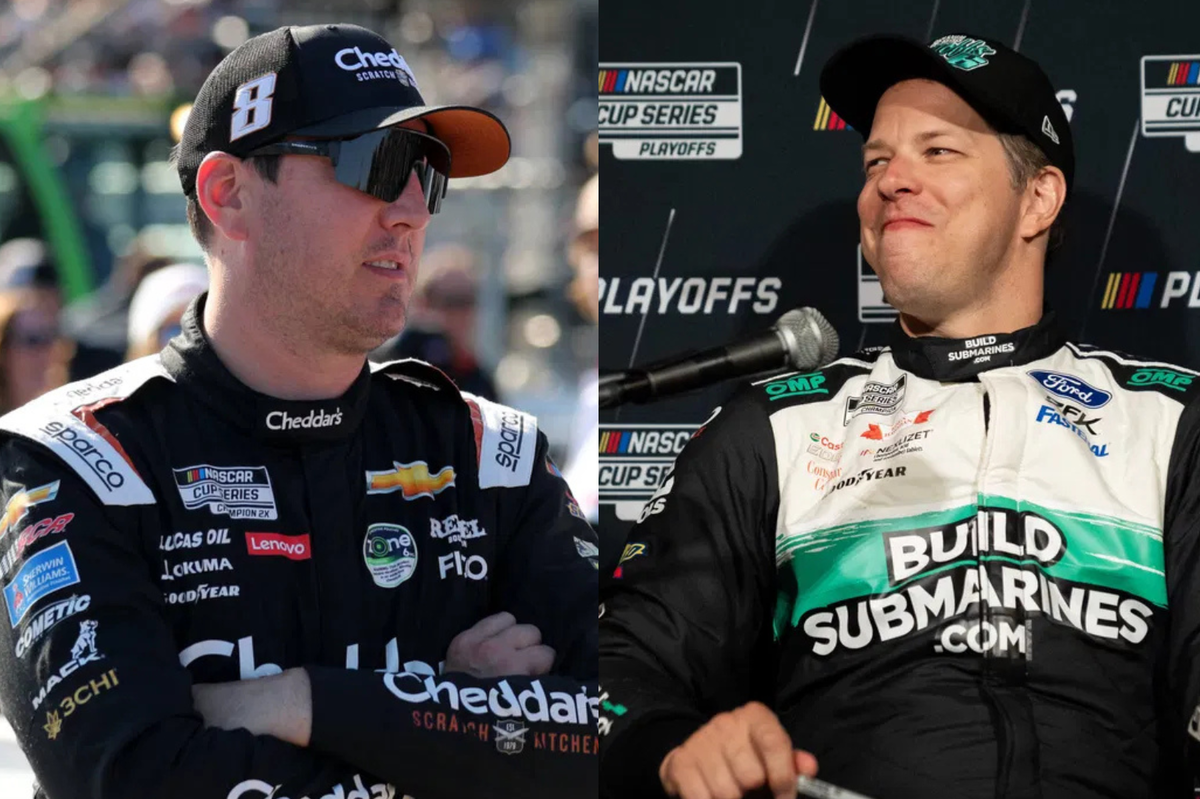

Brad Keselowski knows the answer to what happens when a decade-old insult collides with a futuristic NASCAR commercial? Back in 2010, he stood at Bristol Motor Speedway and, in front of a roaring crowd, spat the words “Kyle Busch is an a–,” that defined a rivalry: It became a tagline, a declaration, and a snapshot of one of NASCAR’s most combustible feuds. Montoya and Keselowski had been talking before the driver intros, and the multi-time Formula One race winner dared him to say it on the microphone in front of everyone else and walked off. Kyle Busch, in response to it, said, “Who? I don’t know who you’re talking about. I saw it, but I passed it.”
Watch What’s Trending Now!
Fast forward to May 2025, and those same rivals, once sworn enemies, were seen climbing into a DeLorean, engaging in a conversation with each other, and Keselowski saying, “Ah! There he is, the new two-time champion,” after Kyle’s win in 2019 at Miami. “Time-traveling” together in a NASCAR ad to announce Homestead-Miami Speedway as the host of the 2026 Championship finale. It revolved around Mockery, Humour, and Camaraderie. The annoyance of Kyle Busch when saying, “What the heck, Brad? I am already late for my party.” And now, Keselowski is in the spotlight to answer. Does he still think the same of Busch? The advert seemed to say otherwise. But what does Keselowski have to say?
Keselowski revives old wounds with Busch
In a Reddit Q&A, by NASCAR’s Reddit Reax, Keselowski confronted the fans’ questions head-on. “Our first question, Hamdinger125, wants to know ‘Do you still think Kyle Busch is an a*?’ Followed up by Ewall100, ‘If he is still an a–, why did you time travel with him?’” The perspective aligns with their history. When they collided in the Nationwide race at Bristol in 2010, both were legitimate contenders. Their heated battles in the years that followed, such as the 2011 Kansas incident where Keselowski pulled off a gutsy win despite a broken ankle, or the 2012 Chicagoland exchanges, were fueled by each pushing the other in moments that mattered.
Keselowski responded in layers, saying, “Kyle and I have had an interesting relationship over the last decade or so. Probably more lows than highs. Here’s the thing about rivalries. You cannot have a rivalry if the two drivers are not running in the top 10. It’s not a rivalry, it’s just a petty argument at that point. Until either one of us is consistently running in the top 10, there is no room for me to worry about Kyle Busch. So I don’t think about him being an a– or not an a–. If Kyle Busch and I are both in the top 10, yeah, he’s an a–.”
Even later dust-ups, like Richmond in 2014 when Keselowski called Busch’s blocking “desperate,” carried weight because both were inside the playoff conversation. These flashpoints made the rivalry worth more than soundbites; they shaped how races played out. That response reframes the feud in the simplest of terms: relevance is dictated by performance. The Bristol insult in 2010 mattered because both men were front-runners, racing for wins under the brightest lights. Over the years, the rivalry has flickered moments of contact, verbal jabs, and even dismissive silence, but Keselowski insists it only holds meaning when both are true contenders.
The Reddit exchange, then, wasn’t about rehashing bitterness, but about defining what rivalry means in NASCAR: competition at the top. And yet, the commercial complicates the story. NASCAR paired the two drivers in a “Back to the Future”-inspired skit, where Busch and Keselowski leap from 2019 to 2026, joking about the future of the sport and poking fun at Denny Hamlin, “Does Denny ever win the cup championship?” in the process.
For fans, the irony was irresistible: the same men who once couldn’t share a straightaway were now sharing a script. Kyle Busch later admitted the high-five scene with Keselowski felt “weird,” but he laughed it off, noting, “When you’re a good actor, you can make anything work.” What emerges is a rivalry turned cultural reference point. On the track, it might be dormant, but off it, the Keselowski-Busch saga still drives storylines, whether in a Reddit AMA or in a time-traveling DeLorean.
When Brad Keselowski set rivalry aside for injured Kyle Busch
When Kyle Busch suffered a devastating injury in the season-opening Xfinity Series race at Daytona, much of the NASCAR world rallied around him. But perhaps the most unexpected reflection came from Brad Keselowski, a driver long entangled in one of the sport’s fiercest rivalries with Busch. For years, the two had been defined by their clashes, sharp words, hard racing, and a tension that seemed inseparable from their reputations. Yet in the absence of Busch on the track, Keselowski found himself reassessing what that rivalry meant. It dated back to an encounter at Lucas Oil Indianapolis Raceway Park in 2001.
“Not having Kyle around actually made me think about our relationship. Our rivalry is pretty well documented. We’ve made comments about each other that have made headlines. But the strange thing is that we have more in common than you’d think,” Brad Keselowski’s blog read. It wasn’t just the headlines or the heated exchanges. Beneath it all, there was a shared journey. Both men had climbed NASCAR’s ladder with strikingly similar paths, forged by raw talent, aggressive instincts, and an unrelenting drive to prove themselves. They knew the pressure of fighting for relevance in the Cup Series and the grind it took to stay among the elite. That mutual experience, as Keselowski admitted, made Busch’s absence hit differently.
“When it comes to the way we race, Kyle and I share a lot of similarities. Our paths to the Cup series, in many ways, were also pretty similar. Yet somehow, we’ve never had much of a relationship at all. I’m not sure why, and quite honestly, I wish things were different,” Keselowski wrote. The Daytona crash wasn’t just about one competitor being sidelined; it was about the sudden void left in a sport where rivals often sharpen each other’s greatness. For Keselowski, Busch’s injury underscored how intertwined their careers had become, even if friendship never blossomed.



